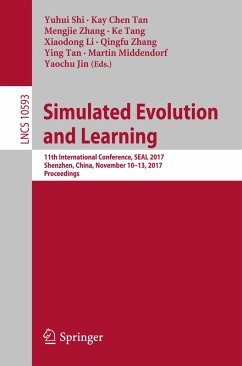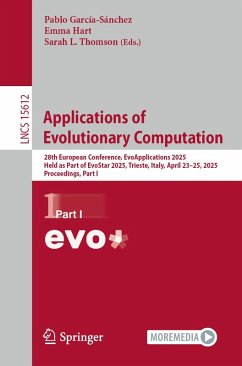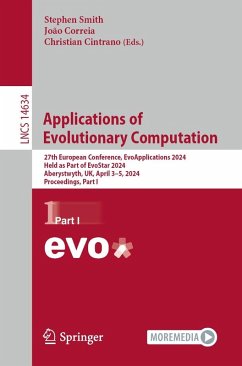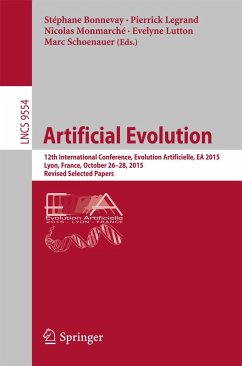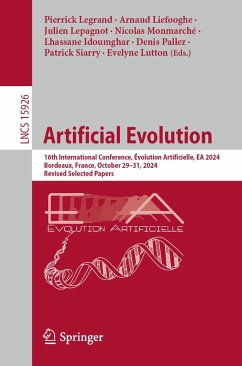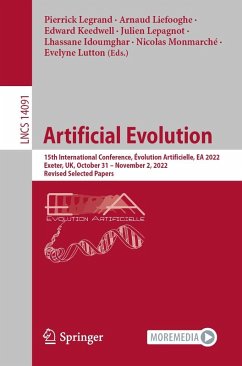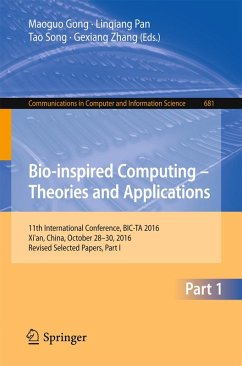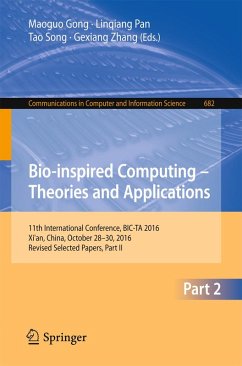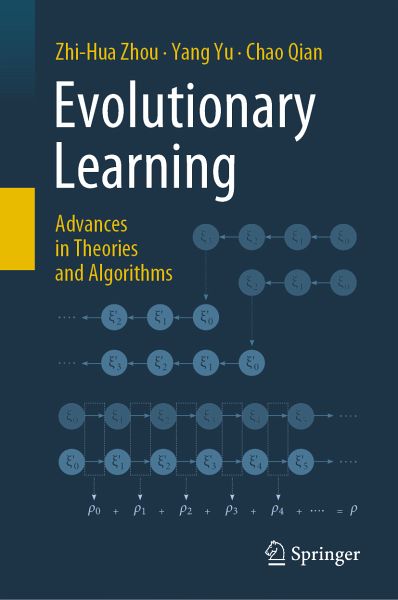
Evolutionary Learning: Advances in Theories and Algorithms (eBook, PDF)
Versandkostenfrei!
Sofort per Download lieferbar
Weitere Ausgaben:

PAYBACK Punkte
52 °P sammeln!






Evolutionary Learning: Advances in Theories and Algorithms (eBook, PDF)
Dieser Download kann aus rechtlichen Gründen nur mit Rechnungsadresse in A, B, BG, CY, CZ, D, DK, EW, E, FIN, F, GR, HR, H, IRL, I, LT, L, LR, M, NL, PL, P, R, S, SLO, SK ausgeliefert werden.
Zhi-Hua Zhou is a Professor, founding director of the LAMDA Group, Head of the Department of Computer Science and Technology of Nanjing University, China. He authored the books "Ensemble Methods: Foundations and Algorithms" (2012) and "Machine Learning" (in Chinese, 2016), and published many papers in top venues in artificial intelligence and machine learning. His H-index is 89 according to Google Scholar. He founded ACML (Asian Conference on Machine Learning), and served as chairs for many prestigious conferences such as AAAI 2019 program chair, ICDM 2016 general chair, etc., and served as action/associate editor for prestigious journals such as PAMI, Machine Learning journal, etc. He is a Fellow of the ACM, AAAI, AAAS, IEEE and IAPR.
Yang Yu is an associate Professor of Nanjing University, China. His research interests are in artificial intelligence, including reinforcement learning, machine learning, and derivative-free optimization. He wasrecognized in "AI's 10 to Watch" by IEEE Intelligent Systems 2018, and received several awards/honors including the PAKDD Early Career Award, IJCAI'18 Early Career Spotlight talk, National Outstanding Doctoral Dissertation Award, China Computer Federation Outstanding Doctoral Dissertation Award, PAKDD'08 Best Paper Award, GECCO'11 Best Paper (Theory Track), etc. He is a Junior Associate Editor of Frontiers of Computer Science, and an Area Chair of ACML'17, IJCAI'18, and ICPR'18.
Chao Qian is an associate Researcher of University of Science and Technology of China, China. His research interests are in artificial intelligence, evolutionary computation and machine learning. He has published over 20 papers in leading international journals and conference proceedings, including Artificial Intelligence, Evolutionary Computation, IEEE Transactions on Evolutionary Computation, Algorithmica, NIPS, IJCAI, AAAI, etc. He has won the ACM GECCO 2011 Best Paper Award (Theory Track) and the IDEAL 2016 Best Paper Award. He has also been chair of IEEE Computational Intelligence Society (CIS) Task Force "Theoretical Foundations of Bio-inspired Computation".
Yang Yu is an associate Professor of Nanjing University, China. His research interests are in artificial intelligence, including reinforcement learning, machine learning, and derivative-free optimization. He wasrecognized in "AI's 10 to Watch" by IEEE Intelligent Systems 2018, and received several awards/honors including the PAKDD Early Career Award, IJCAI'18 Early Career Spotlight talk, National Outstanding Doctoral Dissertation Award, China Computer Federation Outstanding Doctoral Dissertation Award, PAKDD'08 Best Paper Award, GECCO'11 Best Paper (Theory Track), etc. He is a Junior Associate Editor of Frontiers of Computer Science, and an Area Chair of ACML'17, IJCAI'18, and ICPR'18.
Chao Qian is an associate Researcher of University of Science and Technology of China, China. His research interests are in artificial intelligence, evolutionary computation and machine learning. He has published over 20 papers in leading international journals and conference proceedings, including Artificial Intelligence, Evolutionary Computation, IEEE Transactions on Evolutionary Computation, Algorithmica, NIPS, IJCAI, AAAI, etc. He has won the ACM GECCO 2011 Best Paper Award (Theory Track) and the IDEAL 2016 Best Paper Award. He has also been chair of IEEE Computational Intelligence Society (CIS) Task Force "Theoretical Foundations of Bio-inspired Computation".
Produktdetails
- Verlag: Springer Nature Singapore
- Seitenzahl: 361
- Erscheinungstermin: 22. Mai 2019
- Englisch
- ISBN-13: 9789811359569
- Artikelnr.: 56888651
"The book is clearly and nicely written and is recommended for everyone interested in the new development in evolutionary learning." (Andreas Wichert, zbMATH 1426.68004, 2020)
Für dieses Produkt wurde noch keine Bewertung abgegeben. Wir würden uns sehr freuen, wenn du die erste Bewertung schreibst!
Eine Bewertung schreiben
Eine Bewertung schreiben
Andere Kunden interessierten sich für


